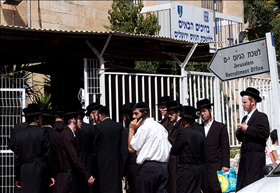Once more clandestinely
Implementation begins on reform of the sweeping exemption from military service for yeshiva boys
Yeshiva students aged 22 and up who perform a year long civil service will be exempt from all military service. Hiddush head Rabbi Regev: ‘The government is conducting the exemption operation like thieves in the night’
21/03/2011 11:44
Tags: Israel army · haredim · Hiddush

Haredim at recruitment office Flash90
The government began in the past few days to implement the reform in the sweeping exemption from military service for yeshiva boys. Under the reform a yeshiva student aged 22 and older will be exempt from military service if he performs one year of civil service. Every yeshiva student aged 28 and older will be exempt from any military or civil service, which will lead to immediate exemptions for some 12,000 yeshiva boys. Implementation of the reform began even though the matter is still under deliberating in the High Court of Justice.
Hiddush head Rabbi Uri Regev said in response: “The government is conducting the mass operation to grant exemptions to yeshiva students and eliminate the people’s army like thieves in the night, without telling the public. This is precisely like what it did in the summer, when Hiddush first brought the exemption reform to light. Implementation of the exemption operation began without informing the petitioners to the High Court of Justice against the Tal Law, and apparently also without informing the High Court itself.”
According to Regev, “it is not by chance that everything is being done clandestinely. The government realized that it had failed in its attempt to market the ‘exemption reform’ as an operation to increase enlistment of haredim. The public that shoulders the burden, serves in the military, and risks its life to protect the country understands that it is being spat at in the face. There is only one conclusion: Israel needs a civil government that will also look out for those who bear the burden and will not fold in the face of haredi politicians.”
On July 16, 2010, as part of the package of decisions called “the economic policy,” the government decided to permit every yeshiva student aged 22 and up to perform civil service for a year instead of
Implementation of the exemption operation began without informing the petitioners
military service. The decision was buried amid the hundreds of pages of the economic plan. Hiddush brought it to the public’s knowledge.
In the wake of the petitions filed by three organizations, the government decided several times to postpone the implementation of the exemption decision. It set up a team headed by the director-general of the Prime Minister’s Office, Eyal Gabbay. He suggested setting a service target for haredi men of 5,000 for 2015. The Gabbay plan was presented as a reform that would lead to haredi enlistment. In practice it was almost the same plan for a sweeping exemption of yeshiva students:
- Yeshiva students aged 22 and up, married and single, will be exempt from • military service if they perform a yearlong civil service.
- 26-year-old yeshiva students will be able to do an abbreviated military service of three months.
- 12,000 yeshiva students aged 28 and older or who have three children will receive an immediate exemption from military service (in the wording of the government decision this is defined as a referral to the reserves).
The government approved the plan on January 16, 2011, but its implementation was postponed until after the hearing in the High Court of Justice on revoking the Tal Law. In the hearing that was held on January 30, the justices asked whether the state would be willing to put off implementing the clauses in the reform that exacerbate the inequality until after the verdict is handed down. On February 21 the state replied in the negative to the High Court’s question. The official in charge of High Court petitions at the State Prosecutor’s Office, Osnat Mandel, announced that the state wishes to implement the reform in one piece.
While the petitioners await the High Court’s response, the director-general of the Prime Minister’s Office, Eyal Gabbay, ordered to begin implementing the reform.